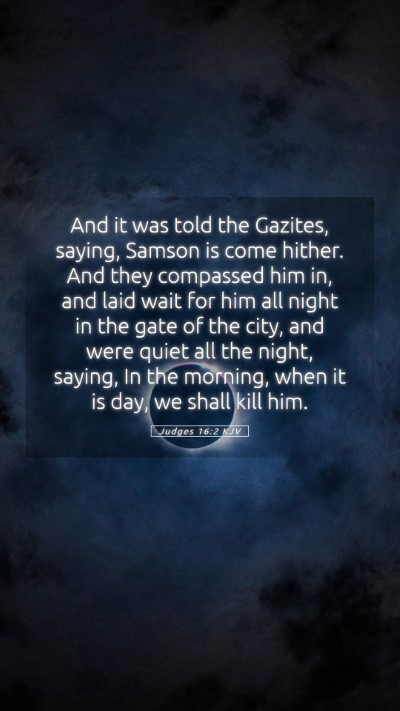Bible Verse Explanation: Judges 16:2
The verse Judges 16:2 states, "And it was told the Gazites, saying, Samson is come hither. And they encompassed him in, and laid wait for him all night in the gate of the city, and were quiet all the night, saying, In the morning, when it is day, we shall kill him."
Context and Overview
This dramatic narrative occurs in the life of Samson, one of the judges of Israel. In this segment, we see a key moment in the ongoing engagement between Samson and the Philistines, highlighting themes of strength, betrayal, and divine purpose.
Insights from Commentaries
Bringing together the insights from Matthew Henry, Albert Barnes, and Adam Clarke, we can derive a deeper understanding of this passage:
-
Matthew Henry: Henry reflects on the nature of Samson's encounters with the Philistines, pointing out that despite his supernatural strength, Samson constantly found himself in perilous situations due to his unwise choices, particularly in relationships. This verse illustrates how he, unwittingly, set himself up for ambush by revealing his presence in enemy territory.
-
Albert Barnes: Barnes emphasizes the strategic machinations of the Philistines, who were determined to capture Samson. The fact that they planned to wait until dawn indicates their cunning nature and the seriousness of the threat against Samson. This highlights Israel's vulnerability and the Philistines' persistent efforts to suppress Israel’s deliverer.
-
Adam Clarke: Clarke points out the symbolic dimensions of the gates of the city, which represent both security and vulnerability. The ambush at the gates illustrates a significant turning point in Samson's story, emphasizing that worldly security can lead to spiritual forfeiture, as Samson's strength was also intertwined with his obedience to God.
Theological Themes
Several key themes emerge from Judges 16:2 that require careful exegesis:
- Divine Providence: Despite the impending danger, God’s control over events remains evident. Judges 16 begins the culmination of Samson’s mission, where even in moments of peril, God has a plan.
- Human Weakness: The story underscores human susceptibility to temptation and folly, with Samson's decisions illustrating the lifelong struggle between strength and weakness.
- Conflict Between Good and Evil: The ongoing battle with the Philistines stands as a metaphor for the spiritual conflicts believers face, emphasizing that evil often lays in wait for the unwary.
Application of the Verse
Judges 16:2 encourages readers to reflect on their own vulnerabilities and the importance of making choices aligned with divine guidance. In the quest for understanding Scripture, believers are urged to:
- Be vigilant against temptations that distract from God’s purpose.
- Recognize the consequences of their actions on their spiritual journeys.
- Seek God’s presence in times of trouble instead of relying on individual strength.
Bible Study Insights
For those engaging in Bible study groups or seeking online Bible study resources, this passage provides rich material for discussion:
- Explore the historical context of the Philistine-Israelite conflict.
- Analyze the character of Samson and identify lessons from his life.
- Discuss the applications of divine protection and human responsibility.
Cross References
This verse connects with several significant passages, enhancing its meaning:
- Judges 14:5-6: Samson’s initial encounters with the Philistines begin here, showcasing his strength and the tensions that arise.
- Judges 15:9-13: This presents further context regarding the Philistine oppression and the societal state of Israel.
- Philippians 4:13: A reminder of the ultimate source of strength for believers lies in faith, contrasting Samson’s dependence on personal strength.
Conclusion
Judges 16:2 serves as a profound reminder of the complexities of human nature and divine purpose. Through careful scripture analysis and understanding biblical exegesis, believers can uncover the layers of meaning found within this verse, enhancing their overall Bible verse interpretation and commentary.
Utilizing this wisdom, readers are encouraged to delve deeper into the meanings of Bible verses and their applications in life, creating opportunities for growth and understanding in their faith journey.


